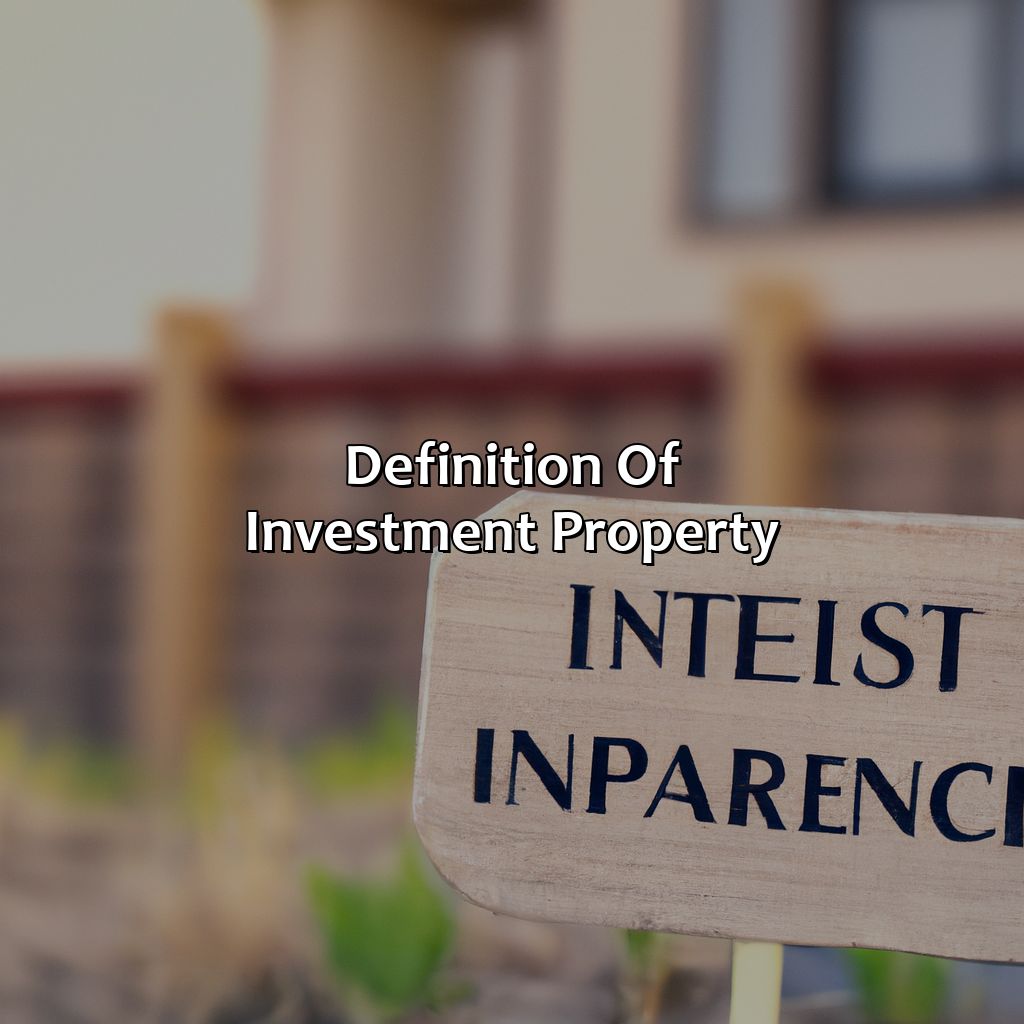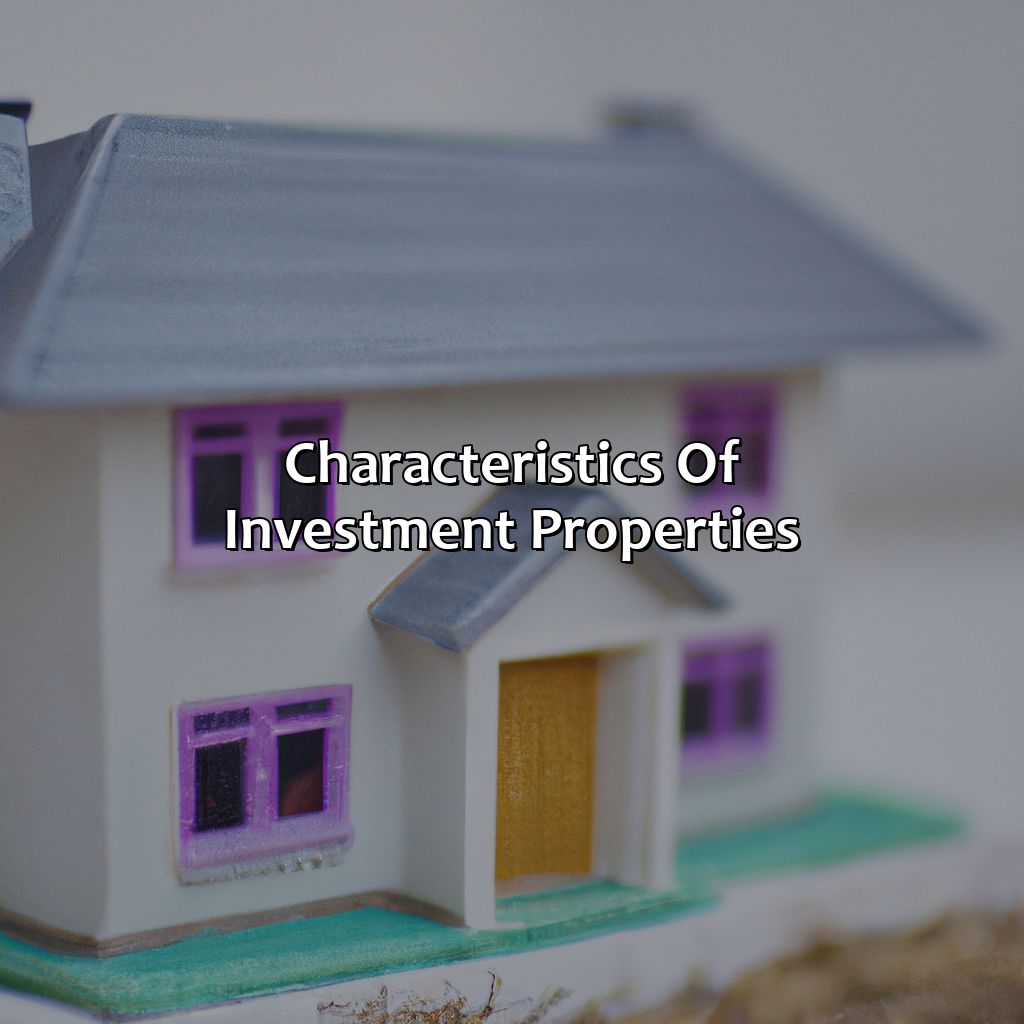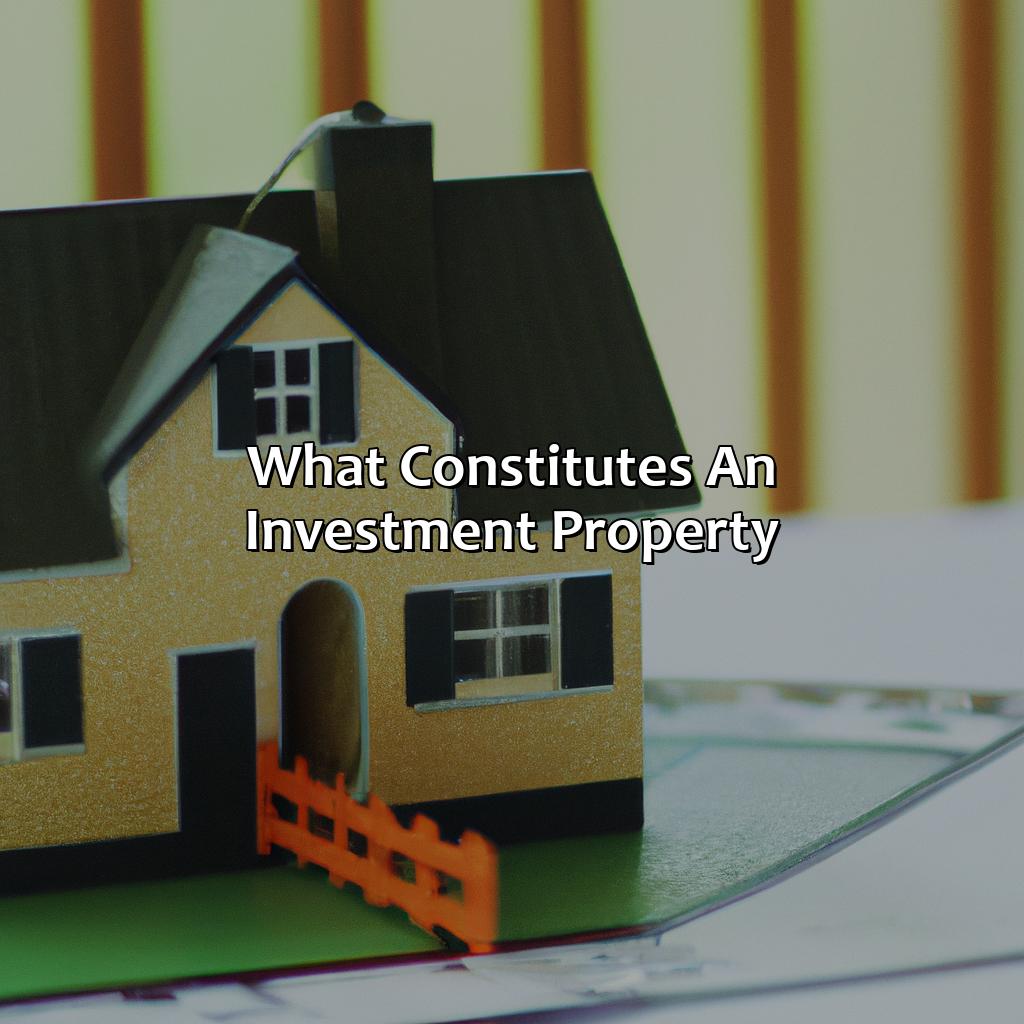What Constitutes An Investment Property?
Key Takeaway:
- Investment property refers to real estate property purchased with the intention of earning a return on investment by renting or reselling it. Such property can include residential, commercial, or industrial properties, among others.
- The income generation potential of investment properties depends on their location, market demand, and condition, among other factors. Properties with long-term appreciation potential and manageable expenses are also desirable.
- The decision to invest in a property should be based on careful consideration of these factors, as well as the investor’s goals, risk tolerance, and financial resources.
Do you want to make a smart investment in real estate? Learn about the criteria for investing in a property, so you can make an informed decision. You’ll be able to understand what constitutes an investment property and weigh the pros and cons.
Definition of investment property
Investment properties refer to real estate assets or properties that are purchased with the intent of generating profits. These properties can be residential, commercial, or industrial and are bought with the aim of earning rental income, capital appreciation, or both. They are usually separate from a buyer’s primary residence, and the investor usually does not occupy them.
Investment properties can generate income through rent, which can be a constant flow of cash for the investor. Additionally, properties can appreciate in value over time, which means the investor can sell the property for more than they bought it for, earning a profit.
Something crucial to note is that the purchase of an investment property is generally not because of emotional attachment, but instead, it’s a strategic financial decision. Investors need to consider factors such as location, market trends, and the potential for returns before investing in a property. It’s important to seek advice from industry professionals, such as real estate agents and financial advisors, to make informed decisions.
For example, a business owner purchases a commercial property to rent it out to other businesses. The property generates steady rental income, which helps the owner’s cash flow. As the economy grows, the property may appreciate in value, and the owner can sell it for a profit later.

Image credits: retiregenz.com by Joel Arnold
Types of investment properties
To comprehend the sorts of investment properties, investigate residential, commercial, and industrial properties. Every one of these sub-sections offers unique benefits and disadvantages which should be considered before settling on an investment decision.

Image credits: retiregenz.com by James Woodhock
Residential properties
Investors may choose to invest in residential properties because they require less capital compared to other types of investment properties like commercial or industrial properties. Residential tenants stay longer and cause fewer problems than commercial tenants.
It is important to note that investing in residential properties requires careful consideration of location, local housing market rates, expected maintenance cost, legal agreements and more.
According to the National Council of Real Estate Investment Fiduciaries (NCREIF), “as of 2020, the total return on residential real estate investments was 9%”.
Buying a commercial property is like getting married: it’s a big commitment, requires a lot of investment, and can be a source of both joy and headaches.
Commercial properties
For investors, the difference between commercial and residential properties is significant. A commercial property is a building intended for business activities or commerce. These can include office buildings, retail spaces, industrial sites and warehouses. Typically, tenants who rent commercial spaces are businesses rather than individuals. An investor’s income from commercial property can vary depending on the type of lease agreement entered into by the parties involved.
Investors typically opt for commercial properties because of their high potential to yield significant income, particularly when they’re located in high-traffic areas. This can be amplified when there are long-term lease commitments from tenants as these provide stability and predictability in rental income flows over extended periods of time.
It is worth noting that some risks come with investing in commercial properties such as the possibility of regulatory changes affecting supply and demand and market dynamics of certain industries specific to the market location that may impact values. As with all investments – risk happens.
According to Forbes.com on June 22, 2021, San Francisco was noted as having some of the most expensive commercial real estate found within North America based on square footage prices.
Industrial properties: where the sound of heavy machinery is music to your ears and the smell of oil is the sweet scent of success.
Industrial properties
Characters of commercial real estate fit the category of Property Investments, and among them are Industrial Assets. They consist of buildings that are primarily used for manufacturing goods or aggregated goods to be supplied to other businesses, wholesalers, and retailers. Typically warehouses, factories or distribution centres, they come in various shapes and sizes based on particular requirements, such as e-commerce warehouses and data centres.
Located in prime areas close to transportation links like railways, motorways and airports the modern industrial real estate market is poised for growth. With an increase in online shopping environments such as Amazon’s efficiency-focused mechanised warehouses demand regional markets continue to grow at a rapid pace.
According to CBRE Research, the average availability in North America was decreasing by 5% year-over-year from 2013-2017 due to strong tenant demand for high-quality logistics facilities.
Why settle for a fixer-upper when you can invest in a money pit?
Characteristics of investment properties
Want to make wise investments? Focus on income generation, long-term appreciation, and manageable expenses. We’ll explore these key aspects for successful investments that bring long-term financial benefits.

Image credits: retiregenz.com by Yuval Arnold
Income generation potential
Investment properties are characterized by their potential to generate income. These properties are purchased with the intention of generating a return on investment through rental income, capital appreciation or both. Income generation potential can be evaluated based on the property’s location, market demand, and rental rates. In addition, investors typically assess the overall condition of the property; it should be in good shape to attract tenants who will pay higher rents.
Investors often prefer investment properties that have diversified streams of income such as apartments or commercial buildings with multiple tenants who pay rent. A well-managed investment property generates steady cash flow and grows in value over time due to market trends and renovations made to improve its attractiveness.
It is important to note that income generation potential varies among different types of investment properties. Rental properties generate income through monthly rent payments while commercial properties may earn income from rent, leasing fees or occupancy percentage bonuses.
One noteworthy example is the Empire State Building in New York City which was purchased as an investment property in 1961 by a group led by real estate tycoon Harry Helmsley. Despite economic downturns and extensive renovation expenses, the building continued to generate significant income from commercial occupancy and tourism until its sale 50 years later for almost $2 billion. As such, it has become one of the most iconic and profitable investment properties in history.
Buy an investment property and watch your net worth appreciate faster than your sanity during tax season.
Long-term appreciation potential
Investment properties have significant potential for long-term appreciation. This potential is driven by various factors, such as location, market trends and property condition. Property location plays a vital role in the asset’s value appreciation over time. A suitable location with amenities like schools, healthcare facilities and transportation options significantly impacts a property’s long-term value. Additionally, favorably trending markets and well-maintained properties have higher potential to appreciate over the years.
Furthermore, having a long-term appreciation potential means that investors can expect their investment to grow in value over time. For example, investing in an area with upcoming developments or investments can result in increased demand for housing, leading to higher property value. Having a clear investment strategy that considers factors such as location and trends can help maximize returns on investment.
Pro Tip: Conduct thorough research before investing to identify areas with high appreciation potential and assess the overall costs and benefits of the investment.
Real estate investing: where the only manageable expenses are your sense of humor and your therapist bills.
Manageable expenses
Maintaining a cost-efficient investment property is crucial to obtaining maximum returns. Properly managing controllable expenses such as maintenance, insurance and repairs can lead to significant savings in the long run. Furthermore, making upgrades and investing in energy-efficient systems can also reduce expenses while increasing rental rates. It is important to find a balance between maintaining the property’s value and minimizing costs that may reduce returns over time.
Remember, if you don’t consider all the factors before investing in a property, you might end up with a haunted mansion instead of a cash cow.
Factors to consider when investing in a property
To work out what an investment property is, think about these points: “Factors to consider when investing in a property.” They are location, market demand and the condition of the property. It’s vital to take these into account to make sure your investment succeeds or fails.

Image credits: retiregenz.com by James Jones
Location
The geographic location of a prospective investment property is one of the most critical factors to consider. This factor heavily influences the price, demand, and potential return on investment. Areas with rising populations and economic growth are prime examples of favorable locations for investing in real estate.
Moreover, other aspects of location should be closely evaluated. Accessibility to transportation hubs or highways, proximity to quality schools and healthcare facilities, safety concerns related to crime rates, and future development plans can all impact a property’s appreciation value and overall success as an investment.
A well-researched tip would be to investigate current zoning laws and future land-use plans for the area to understand what could potentially affect the property’s future value. Market demand is like a wave, so invest in a property that can ride it, not sink under the weight of it.
Market demand
An essential aspect to consider when selecting a property for investment is the market’s inclination towards it. What are the current and future demands? Can your investment sustain in the given market? These questions can be answered by checking trends, patterns and researching the demographics of the area. By knowing your target market, location, demand and supply ratios, you can ensure high occupancy rates making your investment profitable.
Investors must look beyond what they may consider their personal taste but focus on what appeals to potential tenants or buyers. For instance, properties located in cities near workspaces or universities tend to be highly desirable, hence commanding a higher rate. In this way, investors should alter their search criteria to align with an ever-changing real estate world.
It’s crucial to assess how long properties remain empty in areas where you are considering investing. Know what determines demand and adapt to reap maximum benefits from your investment.
Don’t miss out on favourable conditions that can get you excellent returns on real estate investments. Hire an expert who can scour through different aspects of the industry that you might not have considered before striking a deal. By joining hands with professional consultants or companies specialised in property management services, you can eliminate most of these concerns and invest confidently.
You may think a fixer-upper is a good investment, but be prepared to spend more on renovations than you did on the property itself.
Condition of the property
Assessing the Health of a Property
When investing in property, understanding its physical health is vital. Examining factors like foundation, wiring, and plumbing can reveal immediate costs and indicate potential future expenses.
It’s also recommended to determine if any updates or renovations have been made over the years and their quality. Doing so provides insight into whether systems may require modernization soon and how much capital might be required to do so.
Checking for water damage or issues with mold is critical, as they could cause severe health problems and signal high repair bills.
By taking care to investigate these crucial details, investors can make informed decisions about whether a given property is worth its asking price.
Suggested strategies include hiring an experienced inspector or contractor to assess the home’s electrical and plumbing systems thoroughly. Additionally, researching local laws concerning building codes and permits can help preempt violations that could drive up costs later on.
By paying attention to these essential details, investors can maximize their profits while minimizing the risk associated with investing in real estate.
Five Facts About Investment Properties:
- ✅ Investment property refers to real estate that is purchased for the purpose of generating income, such as rental properties or commercial buildings. (Source: Investopedia)
- ✅ Investment properties typically require a larger down payment and have stricter lending requirements than primary residences. (Source: The Balance)
- ✅ The location of an investment property is a crucial factor in determining its potential for profitability. (Source: Mashvisor)
- ✅ Investors can use various strategies, such as fix-and-flip or buy-and-hold, to make money from investment properties. (Source: BiggerPockets)
- ✅ Investment properties can offer various tax benefits, such as deductions for mortgage interest, repairs, and depreciation. (Source: Forbes)
FAQs about What Constitutes An Investment Property?
What constitutes an investment property?
An investment property is a real estate property that is purchased with the intention of generating a return on investment. In other words, it is a property that is purchased with the goal of making money through rental income, capital appreciation, or both.
Can any type of real estate property be considered an investment property?
No, not every type of real estate property can be considered an investment property. The property has to serve a commercial or business purpose, and not be a personal residence.
What are some examples of investment properties?
Examples of investment properties include apartment buildings, commercial buildings, vacation properties, rental homes, and raw land intended for development.
Do I need to purchase an investment property with cash?
No, you don’t necessarily need to purchase an investment property with cash. Many investors use a combination of cash and financing, such as a mortgage, to purchase investment properties.
What factors should I consider before purchasing an investment property?
Before purchasing an investment property, it is important to consider factors such as location, type of property, potential rental income, expenses associated with the property, and the current real estate market.
Is there any tax benefit to owning an investment property?
Yes, there are tax benefits to owning an investment property. These can include deductions for expenses related to the property, such as mortgage interest, property taxes, insurance, repairs, and maintenance. Additionally, profits from the sale of an investment property can be subject to capital gains tax rates that are lower than ordinary income tax rates.


